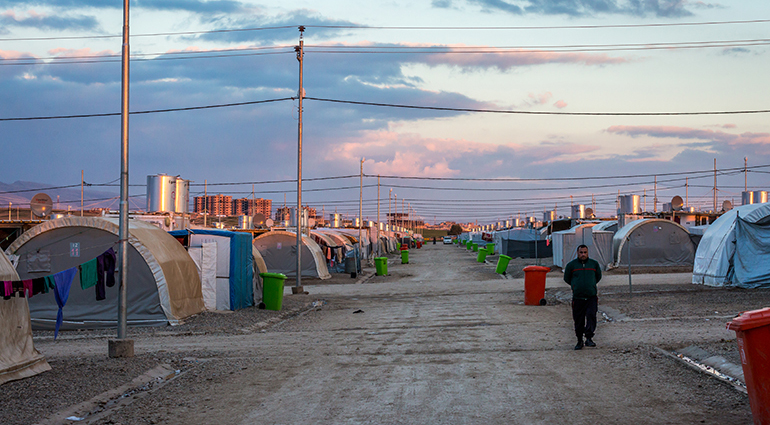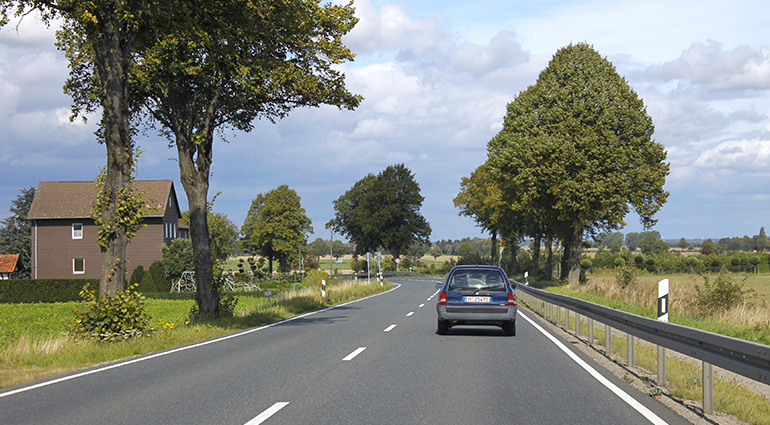The
“We’ve created more information in the last five years than in all of human history before it, and it’s coming at us all the time” (Daniel Levitin, author of The Organized Mind: Thinking Straight in the Age of Information Overload). “In a sense,” Levitin says, “we become addicted to the hyperstimulation.” The constant barrage of news and knowledge can dominate our minds. In today’s environment of media bombardment, it becomes increasingly difficult to find time to be quiet, to think, and to pray.
Psalm 46:10 says, “Be still, and know that I am God,” reminding us of the necessity to take time to focus on the Lord. Many people find that a “quiet time” is an essential part of each day—a time to read the Bible, pray, and consider the goodness and greatness of God.
When we, like the writer of Psalm 46, experience the reality that “God is our refuge and strength, an ever-present help in trouble” (v. 1), it drives our fear away (v. 2), shifts our focus from the world’s turmoil to God’s peace, and creates a quiet confidence that our Lord is in control (v. 10).
No matter how chaotic the world may become around us, we can find quietness and strength in our heavenly Father’s love and power.
Heavenly Father, we bring our noisy lives and our cluttered minds to You so that we can learn to be still and know that You are God.
Each day we need to be still and listen to the Lord.
Getting away to a quiet place can be a way to settle our thoughts. But sometimes the thought of being alone with our thoughts is uncomfortable. Psalm 46 speaks to us about being quiet in the presence of “the God of Jacob,” who is our fortress. Jacob (later named Israel) was a rascal, a liar, and a fugitive from his family.
Jacob struggled with God and God determined Jacob would know Him (see Gen. 32:22–32). It is through Jacob’s line centuries later that Jesus was born to offer us peace and forgiveness.
What could it mean to be still before God, who desired to lovingly father people like Jacob and who desires to be in intimate relationship with each of us? Mart DeHaan
The Turn
For the Jews it was a time of happiness and joy, gladness and honor. Esther 8:16
As the minister spoke at a funeral for an old military veteran, he mused about where the deceased might be. But then, instead of telling the people how they could know God, he speculated about things not found anywhere in Scripture. Where is the hope? I thought.
At last he asked us to turn to a closing hymn. And as we rose to sing “How Great Thou Art,” people began to praise God from the depths of their souls. Within moments, the spirit of the entire room had changed. Suddenly, surprisingly, in the middle of the third verse my emotions overwhelmed my voice.
And when I think, that God, His Son not sparing,
Sent Him to die, I scarce can take it in;
That on the Cross, my burden gladly bearing,
He bled and died to take away my sin.
Until we sang that great hymn, I had wondered if God was going to show up at that funeral. In reality, He never leaves. A look at the book of Esther reveals this truth. The Jews were in exile, and powerful people wanted to kill them. Yet at the darkest moment, a godless king granted the right to the enslaved Israelites to defend themselves against those who sought their demise (Est. 8:11–13). A successful defense and a celebration ensued (9:17–19).
It should be no surprise when God shows up in the words of a hymn at a funeral. After all, He turned an attempted genocide into a celebration and a crucifixion into resurrection and salvation!
Our surprising God often shows His presence when we least expect Him.
Esther is the only book in the Bible in which God’s name is never mentioned. Yet our surprising God often shows His presence when we least expect Him. Haman, who had tried to curry favor with the king to exterminate the Jews, found his plans overturned when God enabled Esther to expose Haman’s sinister plot. Even to this day Jewish people around the world celebrate the Feast of Purim to commemorate God’s intervention to preserve them as His chosen people.
Have you experienced a time when God surprised you by His divine intervention? Dennis Fisher
From Grief to Joy
You will grieve, but your grief will turn to joy. John 16:20
Kelly’s pregnancy brought complications, and doctors were concerned. During her long labor, they decided to whisk her away for a Cesarean section. But despite the ordeal, Kelly quickly forgot her pain when she held her newborn son. Joy had replaced anguish.
Scripture affirms this truth: “A woman giving birth to a child has pain because her time has come; but when her baby is born she forgets the anguish because of her joy that a child is born into the world” (John 16:21). Jesus used this illustration with His disciples to emphasize that though they would grieve because He would be leaving soon, that grief would turn to joy when they saw Him again (vv. 20–22).
Jesus was referring to His death and resurrection—and what followed. After His resurrection, to the disciples’ joy, Jesus spent another forty days walking with and teaching them before ascending and leaving them once again (Acts 1:3). Yet Jesus did not leave them grief-stricken. The Holy Spirit would fill them with joy (John 16:7–15; Acts 13:52).
Though we have never seen Jesus face to face, as believers we have the assurance that one day we will. In that day, the anguish we face in this earth will be forgotten. But until then, the Lord has not left us without joy—He has given us His Spirit (Rom. 15:13; 1 Peter 1:8–9).
Dear Lord, we long to be in Your presence, especially when we face pain and sorrow. Yet You have not left us on our own. The Holy Spirit lives within us—and gives us joy.
One day our sorrow will be turned to joy!
After Jesus told His disciples about His coming betrayal and death (John 13), they were discouraged (14:1, 27). Jesus comforted them with the promise of heaven and the coming Holy Spirit (14:1–21; 15:26–16:15). Like the pain a woman experiences in childbirth, their suffering was temporary (16:21). The baby that causes the pain also provides the occasion for celebration. Bible teacher Warren Wiersbe writes in The Bible Exposition Commentary: “God brings joy to our lives, not by substitution, but by transformation. In birth, God does not substitute something else to relieve the mother’s pain. Instead, He uses what is there already but transforms it.”
How has Jesus transformed your pain into peace, joy, and victory? Sim Kay Tee
You’re an Original
Know that the
Each of us is an original from God’s hand. There are no self-made men or women. No one ever became talented, buffed, or bright all by himself or herself. God made each of us all by Himself. He thought of us and formed us out of His unspeakable love.
God made your body, mind, and soul. And He isn’t done with you; He is still making you. His single-minded purpose is our maturity: “He who began a good work in you will carry it on to completion until the day of Christ Jesus” (Phil. 1:6). God is making you braver, stronger, purer, more peaceful, more loving, less selfish—the kind of person you’ve perhaps always wanted to be.
“[God’s] unfailing love continues forever and his faithfulness continues to each generation” (Ps. 100:5
You’ve been given a love that lasts forever and a God who will never give up on you. That’s a good reason to have joy and to “come before him with joyful songs”! (v. 2).
If you can’t carry a tune, just give Him a shout-out: “Shout for joy to the Lord” (v. 1).
I’m grateful, Father, that You are at work in me. I find it difficult to change and I wonder sometimes how or if I ever will. Yet I know that You are continuing Your work in me and as I look back I will see the growth You are producing. Thank You!
Spiritual growth occurs when faith is cultivated.
The book of Psalms is commonly known as the hymnbook of ancient Israel. But the opening line of Psalm 100 takes this beautiful hymn out of the sanctuary of Israel and places it in the mouths of everyone: “Shout for joy to the
Because God is the Creator of all, He is also the Father of all. We all belong to Him; we are the “sheep of his pasture” (v. 3). We are all called to give Him thanks and praise, even though believers may be the only ones who answer this call. We are commissioned to help those who do not recognize God and His faithfulness to “enter his gates” (v. 4).
Who can you invite into His “gates”? How can you show and tell them about God’s goodness and enduring love? How can you thank Him for His faithfulness to you?
For more on the book of Psalms read, Together With God at dhp.org/TogetherWithGod. J.R. Hudberg
Promise of a Peaceful Home
Everyone will sit under their own vine and under their own fig tree, and no one will make them afraid. Micah 4:4
Sixty-five million. That’s the number of refugees in our world today—people who have had to leave their homes due to conflict and persecution—and it’s higher than it’s ever been. The UN has petitioned leaders to work together in receiving refugees so that every child will get an education, every adult will find meaningful work, and every family will have a home.
The dream of making homes for refugees in crisis reminds me of a promise God made to the nation of Judah when ruthless Assyrian armies threatened their homes. The Lord commissioned the prophet Micah to warn the people that they would lose their temple and their beloved city of Jerusalem. But God also promised a beautiful future beyond the loss.
A day will come, said Micah, when God will call the peoples of the world to Himself. Violence will end. Weapons of war will become farming tools, and every person who answers God’s call will find a peaceful home and a productive life in His kingdom (4:3–4).
For many in the world today, and maybe for you, a safe home remains more a dream than a reality. But we can rely on God’s ancient promise of a home for people of all nations, even as we wait and work and pray for those peaceful homes to become a reality.
God, thank You for the beautiful promise of a home. Please bring peace to our world, and provide for the needs of all of Your children.
God promises His children a peaceful home in His kingdom.
This promise was realized in the person of Jesus. The timeless God has sent His Son to our rescue—and Micah helped prepare people for His arrival. Bill Crowder
Not Fear but Faith
The
“My husband was offered a promotion in another country, but I feared leaving our home, so he reluctantly declined the offer,” my friend shared with me. She explained how apprehension over such a big change kept her from embracing a new adventure, and that she sometimes wondered what they missed in not moving.
The Israelites let their anxieties paralyze them when they were called to inhabit a rich and fertile land that flowed “with milk and honey” (Ex. 33:3). When they heard the reports of the powerful people in large cities (Num. 13:28), they started to fear. The majority of the Israelites rejected the call to enter the land.
But Joshua and Caleb urged them to trust in the Lord, saying, “Do not be afraid of the people in the land” for the “
My friend wasn’t commanded to move to another country like the Israelites were, yet she regretted letting fear close off the opportunity. What about you—do you face a fearful situation? If so, know that the Lord is with you and will guide you. With His never-failing love, we can move forward in faith.
Loving Father, may I not let my fear stop me from following You, for I know that You will always love me and will never leave me.
Fear can paralyze but faith propels us to follow God.
Under His Wings
He will cover you with his feathers, and under his wings you will find refuge. Psalm 91:4
When I think of protection, I don’t automatically think of a bird’s feathers. Though a bird’s feathers might seem like a flimsy form of protection, there is more to them than meets the eye.
Bird feathers are an amazing example of God’s design. Feathers have a smooth part and a fluffy part. The smooth part of the feather has stiff barbs with tiny hooks that lock together like the prongs of a zipper. The fluffy part keeps a bird warm. Together both parts of the feather protect the bird from wind and rain. But many baby birds are covered in a fluffy down and their feathers haven’t fully developed. So a mother bird has to cover them in the nest with her own feathers to protect them from wind and rain.
The image of God “[covering] us with his feathers” in Psalm 91:4 and in other Bible passages (see Ps. 17:8) is one of comfort and protection. The image that comes to mind is a mother bird covering her little ones with her feathers. Like a parent whose arms are a safe place to retreat from a scary storm or a hurt, God’s comforting presence provides safety and protection from life’s emotional storms.
Though we go through trouble and heartache, we can face them without fear as long as our faces are turned toward God. He is our “refuge” (91:2, 4, 9).
Father God, help me trust that You are bigger than any fear I have.
Our Daily Bread welcomes writer Linda Washington! Meet Linda and all our authors at odb.org/all-authors
When fear causes hope to fade, flee to God, the refuge you can reach on your knees.
Psalm 91 is a beautiful expression of confidence in the Lord’s presence and protection. The writer speaks of both physical protection (from arrows, disease, pestilence, plague) and emotional protection from the evils and disasters happening all around (vv. 5–6). But this psalm is also a conversation. The Lord responds to the faith of those who trust Him by saying, “I will rescue him” (v. 14). J.R. Hudberg
Love for Children
He will cover you with his feathers, and under his wings you will find refuge. Psalm 91:4
When I think of protection, I don’t automatically think of a bird’s feathers. Though a bird’s feathers might seem like a flimsy form of protection, there is more to them than meets the eye.
Bird feathers are an amazing example of God’s design. Feathers have a smooth part and a fluffy part. The smooth part of the feather has stiff barbs with tiny hooks that lock together like the prongs of a zipper. The fluffy part keeps a bird warm. Together both parts of the feather protect the bird from wind and rain. But many baby birds are covered in a fluffy down and their feathers haven’t fully developed. So a mother bird has to cover them in the nest with her own feathers to protect them from wind and rain.
The image of God “[covering] us with his feathers” in Psalm 91:4 and in other Bible passages (see Ps. 17:8) is one of comfort and protection. The image that comes to mind is a mother bird covering her little ones with her feathers. Like a parent whose arms are a safe place to retreat from a scary storm or a hurt, God’s comforting presence provides safety and protection from life’s emotional storms.
Though we go through trouble and heartache, we can face them without fear as long as our faces are turned toward God. He is our “refuge” (91:2, 4, 9).
Father God, help me trust that You are bigger than any fear I have.
Our Daily Bread welcomes writer Linda Washington! Meet Linda and all our authors at odb.org/all-authors
When fear causes hope to fade, flee to God, the refuge you can reach on your knees.
Psalm 91 is a beautiful expression of confidence in the Lord’s presence and protection. The writer speaks of both physical protection (from arrows, disease, pestilence, plague) and emotional protection from the evils and disasters happening all around (vv. 5–6). But this psalm is also a conversation. The Lord responds to the faith of those who trust Him by saying, “I will rescue him” (v. 14). J.R. Hudberg
From Fear to Faith
The Sovereign
The doctor’s words landed in her heart with a thud. It was cancer. Her world stopped as she thought of her husband and children. They had prayed diligently, hoping for a different outcome. What would they do? With tears streaming down her face, she said softly, “God, this is beyond our control. Please be our strength.”
What do we do when the prognosis is devastating, when our circumstances are beyond our control? Where do we turn when the outlook seems hopeless?
The prophet Habakkuk’s situation was out of his control, and the fear that he felt terrified him. The coming judgment would be catastrophic (Hab. 3:16–17). Yet, in the midst of the impending chaos, Habakkuk made a choice to live by his faith (2:4) and rejoice in God (3:18). He did not place his confidence and faith in his circumstances, ability, or resources, but in the goodness and greatness of God. His trust in God compelled him to proclaim: “The Sovereign Lord is my strength; he makes my feet like the feet of a deer, he enables me to tread on the heights” (v. 19).
When we are faced with difficult circumstances—sickness, family crisis, financial trouble—we, too, have only to place our faith and trust in God. He is with us in everything we face.
Dear God, I thank You that I can always turn to You. When I am faced with the difficulties of life, I can put my trust in You. Thank you that You are my “refuge and strength, a very present help in trouble.” Psalm 46:1
When faced with difficult circumstances we can trust God to be our strength.
The prophet Habakkuk gives us an inspiring example of someone who argued with God yet came to the point of trusting Him regardless of what happened. He came to believe that God would eventually unmask the idols of the world (literally “nothings”). Habakkuk could not see that the Creator was going to bring judgment against the idolatrous violence in Israel and Babylon. He could not know how God’s Son would ultimately come in a human body to bear the consequence of the world’s rebellion and loss of understanding.
How does the story of Habakkuk encourage you as you face your own challenges of faith? Mart DeHaan
Grateful for Everything
The Sovereign
The doctor’s words landed in her heart with a thud. It was cancer. Her world stopped as she thought of her husband and children. They had prayed diligently, hoping for a different outcome. What would they do? With tears streaming down her face, she said softly, “God, this is beyond our control. Please be our strength.”
What do we do when the prognosis is devastating, when our circumstances are beyond our control? Where do we turn when the outlook seems hopeless?
The prophet Habakkuk’s situation was out of his control, and the fear that he felt terrified him. The coming judgment would be catastrophic (Hab. 3:16–17). Yet, in the midst of the impending chaos, Habakkuk made a choice to live by his faith (2:4) and rejoice in God (3:18). He did not place his confidence and faith in his circumstances, ability, or resources, but in the goodness and greatness of God. His trust in God compelled him to proclaim: “The Sovereign Lord is my strength; he makes my feet like the feet of a deer, he enables me to tread on the heights” (v. 19).
When we are faced with difficult circumstances—sickness, family crisis, financial trouble—we, too, have only to place our faith and trust in God. He is with us in everything we face.
Dear God, I thank You that I can always turn to You. When I am faced with the difficulties of life, I can put my trust in You. Thank you that You are my “refuge and strength, a very present help in trouble.” Psalm 46:1
When faced with difficult circumstances we can trust God to be our strength.
The prophet Habakkuk gives us an inspiring example of someone who argued with God yet came to the point of trusting Him regardless of what happened. He came to believe that God would eventually unmask the idols of the world (literally “nothings”). Habakkuk could not see that the Creator was going to bring judgment against the idolatrous violence in Israel and Babylon. He could not know how God’s Son would ultimately come in a human body to bear the consequence of the world’s rebellion and loss of understanding.
How does the story of Habakkuk encourage you as you face your own challenges of faith? Mart DeHaan











